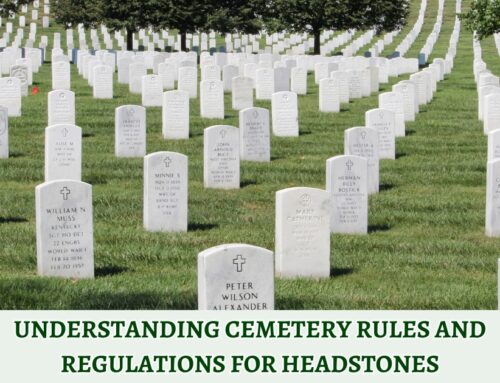The Art of Writing Meaningful Epitaphs
When it comes to memorializing a loved one, writing a meaningful epitaph can be one of the most heartfelt and lasting tributes. An epitaph captures the essence of a person’s life in just a few words, serving as a permanent reminder of who they were and the legacy they leave behind. At Patten’s Michigan Monuments, we understand the importance of crafting a touching and personal epitaph that will stand the test of time. In this blog, we’ll guide you through the art of writing a meaningful epitaph, highlighting key considerations and offering examples to inspire your own tribute.
Why Epitaphs Matter
Epitaphs provide more than just names and dates; they reflect the life, character, and values of the deceased. A well-crafted epitaph can bring comfort to the bereaved, celebrate a life well-lived, and preserve a legacy for future generations. Here’s why epitaphs hold such significance:
- Honoring Legacy: Epitaphs serve as a lasting tribute, honoring the memory and achievements of the departed.
- Offering Comfort: Thoughtful words can provide peace and solace to those visiting the gravesite, offering a reminder of the love and connection shared.
- Creating a Personal Connection: Epitaphs make the grave marker unique to the individual, setting it apart and celebrating the personal qualities that made them special.
Key Elements of a Meaningful Epitaph
Crafting a meaningful epitaph involves more than just choosing a few words. It’s about capturing the spirit of a person and their impact on the world. Below are some key elements to consider:
- Simplicity: Short, concise epitaphs are often the most powerful. A few well-chosen words can say more than a lengthy inscription.
- Tone: The tone of the epitaph should reflect the individual’s personality. Was the person joyful, serious, or spiritual? The tone can be loving, humorous, or profound, depending on how you want to remember them.
- Message: Decide on the message you want to convey. Do you want to celebrate their achievements, share a comforting thought, or express enduring love?
- Religious or Spiritual Sentiments: Many epitaphs include religious or spiritual elements, such as Bible verses, prayers, or quotes from sacred texts.
- Poetry and Quotes: Consider using a line of poetry, a favorite quote, or a phrase that held special meaning to the person.
Popular Epitaph Examples
To help guide you in writing an epitaph, here are some examples commonly used to honor loved ones:
- Religious Epitaphs:
- “In God’s care.”
- “The Lord is my shepherd; I shall not want.”
- “Resting in the arms of the Lord.”
- Epitaphs for Parents:
- “A beloved mother, forever in our hearts.”
- “In loving memory of a father whose love knew no bounds.”
- “Your love will light our way; your memory will be with us forever.”
- Epitaphs for Children:
- “Gone too soon, but forever in our hearts.”
- “Our little angel, now at peace.”
- “A beautiful soul who brought joy to all who knew them.”
- General Epitaphs:
- “Loved and remembered always.”
- “Forever in our hearts.”
- “A life well-lived, a love well-shared.”
Writing a Personalized Epitaph
While popular phrases can be meaningful, creating a personalized epitaph makes the tribute more special. To write a personalized epitaph, consider the following tips:
- Reflect on Their Life: Think about what made your loved one unique. Did they have a particular passion, career, or hobby? Were they known for their kindness, humor, or generosity?
- Ask for Input: Family members and close friends can provide valuable insights into what message would best represent the individual.
- Use Their Words: If the person had a favorite saying or catchphrase, consider including it in the epitaph. This can add a personal and memorable touch.
- Highlight Achievements: If the individual had significant accomplishments, you may wish to highlight these, such as military service, community contributions, or personal milestones.
Common Mistakes to Avoid
When writing an epitaph, there are a few common pitfalls to steer clear of:
- Overcomplicating the Message: Keep it simple and heartfelt. Long, complicated inscriptions may lose their emotional impact.
- Being Vague: Be specific and personal. Avoid generic phrases that don’t say anything about the individual’s character or legacy.
- Neglecting Accuracy: Double-check all spelling, grammar, and dates before finalizing the inscription to ensure the epitaph is accurate.
The Role of Patten’s Michigan Monuments
At Patten’s Michigan Monuments, we understand the emotional weight of writing a meaningful epitaph. Our experienced team is here to help you create a personalized and thoughtful memorial that will honor your loved one’s memory for generations to come. We offer expert guidance in crafting epitaphs that capture the unique spirit of those you cherish.
Conclusion
Writing a meaningful epitaph is an important and personal process. It’s a chance to honor your loved one’s life and create a lasting tribute that speaks to their legacy. Whether you opt for a traditional phrase or a more personalized message, the epitaph will serve as a cherished reminder of their impact on the world.
Explore our services at Patten’s Michigan Monuments to create a timeless and beautiful memorial that honors your loved one’s memory with care and respect.






Leave A Comment